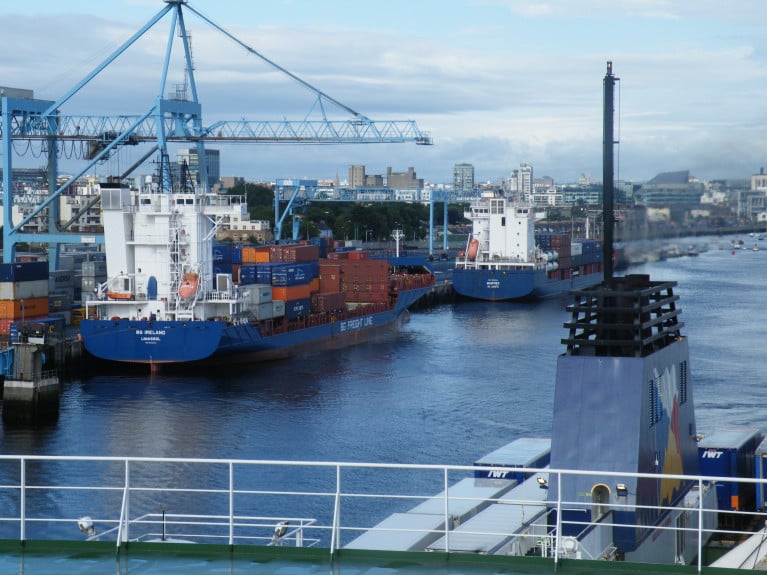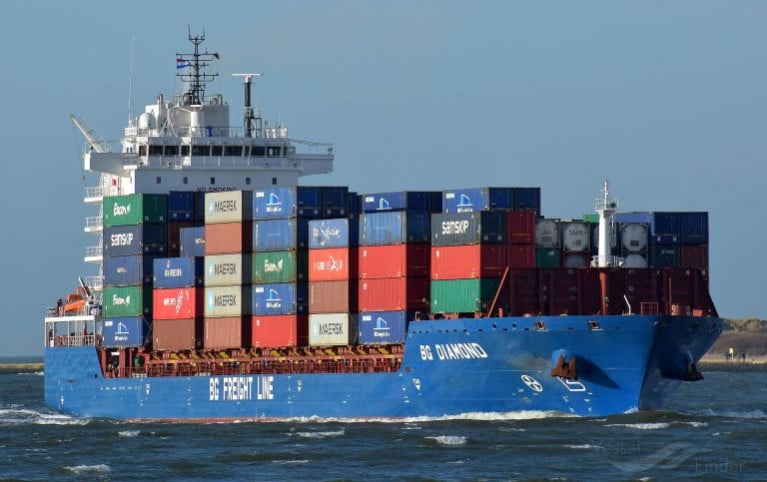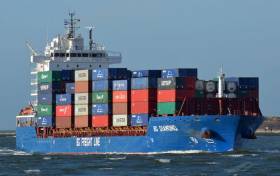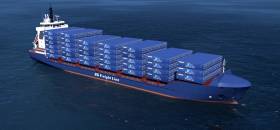Displaying items by tag: BG Freight Line
Peel Port's Clydeport Named Green Champion at Glasgow Business Awards
UK port operator Peel Ports Group which includes Clydeport has won the 'Green Champion' award at the 25th annual Glasgow Business Awards.
Announced at last week's gala ceremony on October 5th, hosted by the Glasgow Chamber of Commerce and attended by over 650 esteemed business figures, the Green Champion award celebrates businesses with a dedication to driving forward green initiatives.
Peel Ports Clydeport faced stiff competition within the category, nominated alongside Glasgow Caledonian University, Kabloom, Lead Powerful Impact and Scottish Sports Futures.
Clydeport’s win comes as recognition of its outstanding investment in sustainability and its industry leading mission to become a net-zero port operator by 2040, five years ahead of the Scottish government’s national decarbonisation targets.
Key developments made to reduce carbon emissions across the Clydeport operation include a £17million investment in installing two state-of-the-art electric cranes at Greenock Ocean Terminal (see photo caption), as well as changing lighting across all sites to LED.
The network of ports has also invested heavily in upgrading its equipment fleet to run on low emission alternatives to fossil fuels, with 88% of its fleet now running on Hydrogenated Vegetable Oil (HVO) and 90% on electric power.
David Wilson, deputy port director at Peel Ports Clydeport said: “We are ecstatic to be recognised for our efforts to dramatically reduce carbon emissions across our sites.
“Investment in sustainability has been key to future proofing our business, ensuring we can continue to offer innovative and cost-effective solutions that will stand the test of time.
“This award represents the dedication and focus of everyone at Clydeport, from senior management to those with boots on the ground, to delivering greener services across all our sites.”
Earlier this month the port operator announced it has significantly reduced its greenhouse gas emissions across its port facilities, cutting these by almost a third since 2020.
The reduction was announced in the group’s new 51-page ESG report - one of the most detailed reports of its kind to be produced by any UK port operator of similar size (see related Liverpool story).
The independently verified figures confirm the group has reduced Scope 1 & Scope 2 emissions across its port operations by a total of 32 per cent, against its 2020 baseline and using a market-based accounting approach.
The cluster of ports was also nominated for the Sustainable Development award on the night, recognising its capabilities to create value through innovative sustainability practices.
Clydeport’s potential to facilitate renewable energy developments was recognised earlier this year when its Hunterston Port and Resource Campus (PARC) was one of 18 sites to be granted national development status under the Scottish government’s National Planning Framework 4 (NPF4), designating it as a strategically important site with a key role in supporting the delivery of Scotland’s national development strategy and transition to net-zero by 2045. The designation has set in motion the redevelopment of the site, allowing for a slew of new renewable energy developments to come onstream.
Value Maritime's Emission Filtree Systems to Be Installed on BG Freight Line Containerships
Value Maritime is to have ship emissions-reducing Filtree Systems, including the Clean Loop 30% carbon capture systems, installed on a quartet of BG Freight Line newbuild container vessels.
Purus Marine and Nordic Hamburg have placed the order with Value Maritime. The contract is a milestone as this represents the first time the company’s revolutionary product has been ordered for installation on newbuild containerships.
The 12.5 MW systems will be delivered between September 2023 and February 2024 and will be installed at Value Maritime’s Dutch berth at the Port of Rotterdam.
The newbuild container vessels of BG Freight Line (which runs feeder services to Ireland, the UK and mainland Europe) follows a previous order in early 2022, when two Filtree Systems with carbon capture involved the containerships BG Onyx and BG Ruby.
Cleaning air and water
The Filtree System is based on innovative technology that filters sulphur, CO2 and 99% of ultra-fine particulate matter from vessels’ exhaust streams. This will enable BG Freight Line to significantly reduce emissions while continuing to sail on high sulphur fuel that is both more cost-efficient and helps to reduce maintenance requirements. In this manner, the Filtree System offers a quick return on investment.
With the Clean Loop mechanism, the system is also able to filter oil residues and particulate matter from its own washing water, giving the water a neutral pH value, which contributes to reducing acidification of seas and rivers.
Carbon circle
The Filtree Systems that will be installed on the newbuild container vessels will additionally feature a modular CO2 capture and storage system. This innovative technology captures CO2 from exhaust emissions and uses it to charge a “CO2 battery,” where it is stored and transported to shore. On shore, the CO2 is discharged for use, for example, in the agricultural industry, after which the battery is returned to the vessel to be recharged, thus representing a 100% circular solution.
Plug and play
The Filtree is a plug and play system. The nature of its design has ensured its straightforward retrofitting. This current order suggests a significant shift is taking place in the maritime industry, with more and more companies considering ways to reduce their emissions.
Laurens Visser, Container Vessels Specialist at Value Maritime: “We are pleased to receive this order, our first for Filtree systems to be installed on newbuild container vessels. This signifies the changes that are presently taking place in decision-making within the industry. Cleaner, more sustainable shipping has risen on the agenda of many maritime companies over the past years. We are now seeing companies proactively looking to reduce their emissions not only retrospectively but from the very outset of operations. This is a welcome development that shows the seriousness with which the industry is taking up the challenges of climate change and the energy transition.”
UK Port Operator Peel Ports Group Announces Major Changes to Senior Leadership Team
One of the UK’s largest port operators, Peel Ports Group which among its facilities includes a container terminal in Dublin Port, has announced major changes to its senior leadership team which is to take effect from 4 April 2022.
Having grown on average by 10% year-on-year for the last decade, and with over £1.2 billion being invested into its operations over the same period, the group’s announcement reinforces its ambition to future-proof the business whilst delivering the next phase of its long-term strategy.
⦁ Chairman Tom Allison is standing down but will remain on the board representing shareholder interests of Peel Group as a non-executive director.
⦁ Mark Whitworth will stand down as Chief Executive Officer but will assume the role of Chairman, overseeing the strategic development and governance of the group.
⦁ Claudio Veritiero will take over as new CEO as the group readies to commence a new investment programme across its primary assets
Mark Whitworth said: “For more than a decade we have consistently been at the forefront of the UK ports industry for the delivery of growth and investment. This has been a transformational period for the business and one that has enabled the group to create thousands of high value jobs within our existing and new facilities.”
“Given that stability in the company leadership has been a cornerstone of our success, the changes we are announcing today have been two years in the planning to ensure a smooth transition.”
“We have ambitious plans to maintain the growth trajectory, which in turn will continue to create positive results not only for our company, but also for the regions and communities we operate within, for many years to come.”
“The time is right for change and Claudio will be integral to making that change happen as he leads the business into an exciting new era.”
Mark Whitworth joined Peel Ports as Chief Executive in 2010 and over his tenure has led major transformations across the business, including the concept and launch of Liverpool2, a £400 million deep water container terminal, the £100m development of a custom-built biomass import terminal for Drax Group plc and the ongoing regeneration of major hubs such as Hunterston PARC and the Inchgreen Dry Dock in Scotland.
Significant acquisitions including the Port of Great Yarmouth and Quality Freight (now known as Peel Ports Logistics) are also included in Mark’s successful portfolio, all contributing to three-fold growth in profitability from when he joined the business.
Speaking about Tom Allison’s retirement as chairman, Mark added: “Tom has been an outstanding mentor throughout his time with our group and has overseen an unprecedented period of success. His business acumen and strategic counsel have been critical over the last 25 years and we are privileged to have him continuing to support the company as a non-executive director.”
Tom Allison was appointed Chief Executive of Clydeport PLC in 1997 and subsequently led the creation of Peel Ports Group in 2003. He then combined the role of CEO and Chairman, overseeing the acquisition of Mersey Docks and Harbour Company in 2005.
Claudio Veritiero joined Peel Ports in 2021 with over 25 years of experience working in the infrastructure, logistics, property development and financing markets. He was previously Chief Operating Officer of Kier Group Plc and has held roles as Chief Operating Officer of Speedy Hire and in the investment banking advisory division of Rothschild & Co.
Claudio said: “Since joining Peel Ports a year ago, I’ve been taken by the calibre of our people, our operations and our customer relationships. I’m delighted to be taking on the role of CEO and will look to build on the unprecedented success that Mark has led over 12 years. One of my priorities will be to take stock of the changing needs of our customers and the port communities in which we operate so that we can further enhance our offering and customer experience.”
“Ports are a vital catalyst for the whole economy, not just the supply chain, with a crucial role to play in creating jobs and enabling economic regeneration. I look forward to working closely with the leadership teams across the business, our customers and our commercial and community partners, as we deliver the next phase of our growth journey.”
Latest Department for Transport data confirms Peel Ports to be one of the fastest growing port groups in the UK, already handling 70 million tonnes of cargo per year and with 15% of the UK’s total port traffic traveling through its waters.
Peel Ports’ key facilities include Port of Liverpool, Manchester Ship Canal, Heysham Port, Clydeport, Great Yarmouth, London Medway and in Dublin Port, the Marine Terminals Ltd container terminal. (Afloat adds the MTL facility is located on the south quays, see photo above).
The ports group also owns BG Freight, the short-sea shipping operator that offers a range of freight and logistics services through Peel Ports Logistics. The group has seen significant growth, averaging 10% year on year across the last 10 years and outlaying over £1.2bn into projects over the same period.
Containers: BG Freight Line Introduce Tri-Weekly Dublin-Liverpool Service to Meet Growing Demand
Container operator BG Freight Line has taken a positive step by adding an additional weekly service call to meet the growing demands of traffic between Liverpool and the Irish Sea hub.
The newly announced service will call between Liverpool and Dublin Port on a tri-weekly basis, ensuring a regular facility to the meet the dynamic needs of each customer in the fast-paced environment of short-sea shipping.
BG Freight Line, part of the Peel Ports Group, provides a comprehensive range of logistics services to and from Ireland, the UK and continental Europe. These services include door-to-door shipping, feedering and quay-to-quay shipping for all types of containerised cargo.
Koert Luitwieler, CEO, BG Freight Line, said: “Our sailing schedule is amongst the best in the business and as part of the Peel Ports Group, we are able to offer the assurance to our customers that we are both an established and reliable partner.
“We are always looking for new growth opportunities and adding another service to the Dublin – Liverpool route will strengthen our excellent Irish Sea network even further. The extra call in Liverpool allows us to meet the demands of our customer, giving them greater flexibility to move last minute cargo closer to its end destination in an ever-changing landscape”.
David Huck, Managing Director, Peel Ports said: “We are delighted to welcome this extra weekly service as it reinforces the strategic importance of this route, as well as our ambition and commitment to provide the seamless movement of goods between Dublin and Liverpool.
“During these uncertain times, it’s imperative that we remain agile for our customers and remain customer-focussed to find a fast solution that ensures cargo, especially essential supplies reaches its destination on time”.
The Port of Liverpool is ideally positioned to be at the heart of a distribution network for UK and Irish markets. The Port is adept at offering innovative and sustainable solutions for warehousing, manufacturing and retail industries, connecting the UK’s major conurbations to both the Irish Sea Hub and beyond.
Shipping Company to Offer New Route from Port of Waterford
A shipping line based in the Netherlands, reports The Irish Times, will open up Waterford port to new international trade routes when it commences a weekly service on the Waterford to Rotterdam route which will act as a deep-sea feeder for Irish importers and exporters.
The Dutch operator BG Freight Line, in partnership with global shipping giant Maersk, is to commence the service on July 6th to support industry in the southeast. Effectively the move will allow goods travelling from Waterford to continue through Rotterdam to other ports such as Shanghai, whereas previously goods for destinations beyond Europe would typically have shipped from Dublin.
Part of the Peel Ports Group, BG Freight Line runs a fleet of 23 containerised vessels from its headquarters in the Netherlands. Maersk, meanwhile, is the largest container logistics organisation in the world, moving more than 12 million containers a year.
BG Freight Line chief executive Koert Luitwieler said the addition of Waterford to its network would strengthen the company’s Irish Sea network which encompassed routes from Dublin and Cork at present.
For more on this new additional Ireland-mainland Europe lo-lo service click here
Construction of Chinese Built 'Ireland' Max Containerships to Enter Service in 2018
#IrelandMax - Containerships currently under construction in China of the 'Ireland' Max class for BG Freight Line, a subsidiary of the Peel Ports Group in the UK are due to enter service next year, writes Jehan Ashmore.
BG Diamond is the first of a quartet of named ships as identified by Afloat earlier this year that is to operate on their short-sea hub feeder services linking Ireland, the UK, Belgium and the Netherlands.
Newbuild BG Diamond will along with sisterships be hired under long-term charter to the Dutch owned subsidiary. The other sisterships each with a 1004TEU capacity are the BG Emerald, BG Sapphire and BG Jade which was only christened last month at the Zhoushan Changhong International Shipyard.
As previously reported a new weekly container service between Liverpool and Cork has begun and this marked the first time the two ports have been connected directly through lo-lo operations. At the end of the each week, the current containerships on this route also offer services between Belfast, Greenock and Liverpool.
At the time of the route's announcement the ships to operate the service were Thea II (see TV presenter Paxman's Boxboat) along with RMS Veritas. However, from 2018, BG Freight will take delivery of the 'Ireland' Max quartet containerships on the short-sea feeder services of the company’s Irish Sea hub operations.
Each newbuild of around 11,000 gross tonnage will have 'green' credentials and built to DNV GL standards and will be fitted with state-of-the-art features in order to comply with Emission Control Area (ECA) requirements. In addition to adhereing to BG Freight Line’s navigation and trading needs.
'Ireland' Max class containerships have been developed by BG Freight Line, in conjunction with designers CIMC ORIC and Arkon Shipping.
Basic specifications of the new 'Ireland' Max containerships:
Containers: 1004 TEU (alternative 488 units 45ft)
Deadweight: 13,250 tonnes (on 8.0m draft)
Length overall: 153m
Reefer plugs: 253
Service Speed: 16 knots
Exhaust cleaning by WET-scrubber
New 'Ireland' Max Containerships for BG Freight Line
#NewContainerships - Container operator, BG Freight Line, a subsidiary of UK based Peel Ports Group, is to receive new tailor-made short-sea 'feeder' containerships optimised for the company’s Irish Sea Hub services.
The new class of ‘green’ vessels has been developed by BG Freight Line operation with ARKON Shipping as project initiator/commercial manager, technical managers Jüngerhans Maritime Services, and designers CIMC ORIC.
BG Freight Line will take delivery of four sister vessels under long-term charter after delivery from Zhoushan Changhong International Shipyard, with them expected to enter service during 2018.
The vessels will be built to DNV GL standards and will be fitted with state-of-the-art features in order to comply with Emission Control Area (ECA) requirements and BG Freight Line’s navigation and trading needs.
They will be fitted with a modern wet scrubber system for exhaust cleaning in order to fulfil the requirements for trading within the ECA area. The vessels are also fully fitted for the loading of 45ft short-sea containers in all positions, with room in total for 488 units.
Additionally, a various number of odd-sized containers can be stowed fast and securely due to a new proprietary and innovative cargo stowage system. To minimise operational cost the vessel will be fitted with a modern two-stroke main engine with very low fuel consumption.
All parameters of the vessels have been optimised for the trade between the North Continent, Ireland and the UK.
Koert Luitwieler, Shipping Director at BG Freight Line said: “As well as helping us, and our customers, to reduce their carbon emissions and costs, these custom vessels have a number of innovations to help keep us at the forefront of feeder services in the Irish Sea. We are looking forward to seeing them in service very soon.”
Ole Gabs, Director of ARKON Shipping said: “We are proud to have developed and managed this project under the current difficult shipping market conditions. We believe that the future for vessel design and construction is to have close partnerships between owners and charterers, especially where there is as ambition to meet the highest environmental standards.”
New 'Ireland' Max Ship Specifications
Container capacity: 1004 TEU, alternative 488 units 45ft
Deadweight: 13,250 tonnes on 8.0m draft
Length overall: 153m
Reefer plugs: 253
Service Speed: 16 knots
Exhaust cleaning by WET-scrubber

































































